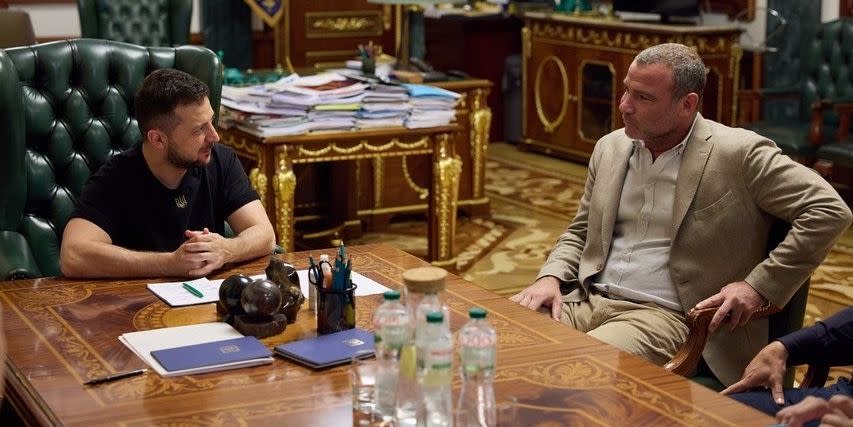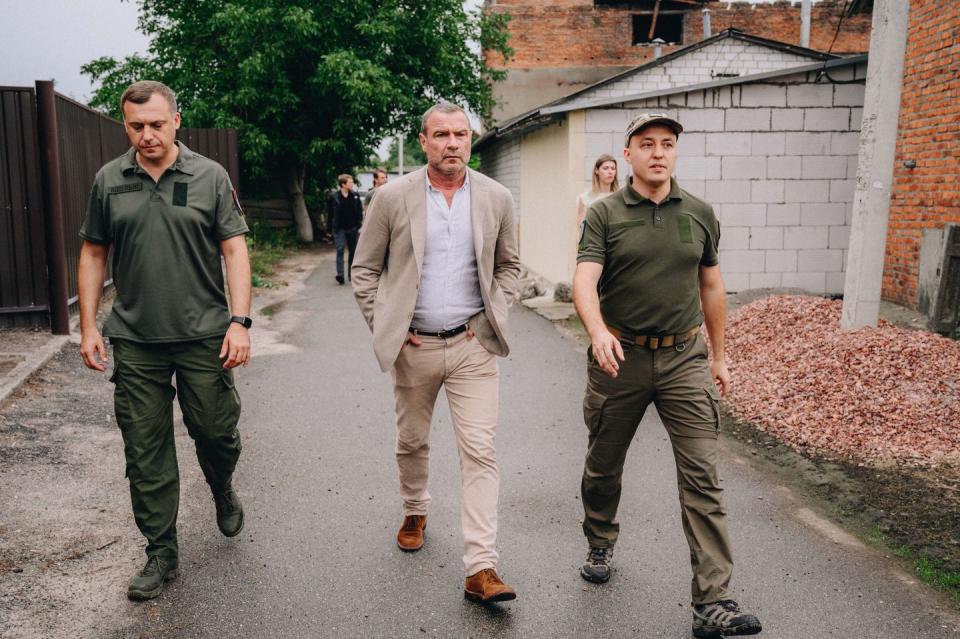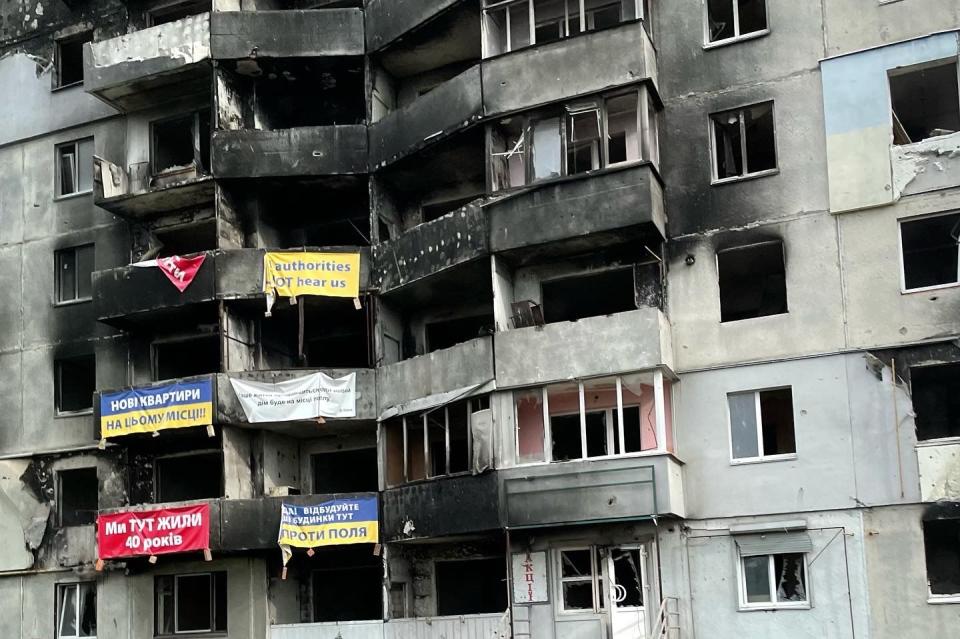Liev Schreiber Is On a Mission to Help Ukraine

We've all been there: confronted with a crisis and overwhelmed by a desire to help, but unsure of where to turn. Social media can be riddled with links to sites that purport to offer aid and the big-name international organizations can seem like safe bets, but is either the right way to go when it comes to addressing crises like the war in Ukraine? It's hard to know.
BlueCheck Ukraine is an organization that identifies and vets non-governmental and humanitarian aid organizations on the ground and directs all funds straight to them. The organization launched in March 2022 and has become an indispensable partner for many groups working to address urgent problems facing the Ukrainian people. One of BlueCheck's founders, the writer, actor, and director Liev Schreiber, spoke to T&C about the group's mission, and why now is always the best time to give.
How did you get involved with BlueCheck Ukraine?
A friend called me, and he wanted to do a live social media thing where I interacted with Ukrainians and got them to tell their stories. I'm sure it was perfectly well-intentioned, but at the time, I was just so frustrated by what was happening that I said, "That's a terrible idea. If you want to help, just send them some money," in less polite language. What I didn't realize is he had all these guys— Jason Cone and Michael Goldfarb—who between them have about 30 years of experience in humanitarian aid. Those guys called me back and they said, "Were you serious about raising money for Ukraine?" And I said, "Yeah, what do you have in mind?"

There seemed to be so many ways to get involved, especially in the early days of the war. What made this opportunity feel right?
We got to talking about what the situation was in Ukraine, what we could do to help with the connections that they had, and what the thin membrane of my celebrity could provide.
A few days later I bought a plane ticket and was on my way to Ukraine. [Bluecheck’s] Jason Cone, Michael Goldfarb, and Murphy Poindexter used their contacts at the embassies and the various branches of Ukrainian government, so that almost immediately I was able to meet with some pretty substantive people.
We saw about five or six NGOs on the first go around. We met one of the groups that we support in Lviv, the Lviv Symphony, who overnight transformed themselves into a distribution hub for humanitarian aids. They took all the seats out of the theater; they filled the entire place up with medical aid and food and supplies. They would rehearse during the day, and at night they would organize all this aid and then pack it up for shipping and coordinate with drivers. They were delivering it to the front line to people who needed it. We had this recording of them playing Mozart's Requiem, so I took that to Washington, D.C. and we had a fundraiser. That was how we got going.
So often, people want to give in times of crisis, but are unsure of where to turn. BlueCheck helps alleviate some of the confusion.
First of all, we wouldn't exist without Ropes & Gray, the international law firm that does all of our vetting and verifying of the NGO brands. There's also another group that we work with called Integrity Risk International, which helps us with the vetting. There's this perception of corruption in Ukraine that's been there for some time, and that they've been working very diligently to get rid of that. Natalie Jaresko, the former finance minister who is a friend and a great helper and servant to Ukraine, was one of the people who led that charge.
If you want to help in Ukraine, we do purely humanitarian aid, which covers medical aid, food, shelter, all of that. The reason is because back in June, Humanitarian Outcomes, a group out of London, published a report on the aid situation in Ukraine [saying] that $2.6 billion had been donated at that point to Ukraine, and of that $2.6 billion, only $6 million had actually made it to the NGOs and the groups on the ground.

There are different reasons for that. A lot of it has to do with how multinationals work. But what we wanted to do was to be very specific about cutting out the middle man and creating a path so money would go directly to the groups on the ground in Ukraine who were providing the services. In other words, it doesn't come to us. We don't get a dime of any of it.
What kind of groups on the ground do you work with?
We try to have as diverse a portfolio of NGOs as we can, because the needs are constantly evolving there. Mental health initiatives, children, medical aid, shelter, there are all sorts of things that come up.
We have a group that caters specifically to homebound elderly people, which you're finding a lot now. We have another group called Cash for Refugees, which helps people leave. All that we do is curate that portfolio of NGOs that we support, and anyone who wants to support Ukraine, we distribute those grants to the groups in our portfolio.

You've made trips to Ukraine. What for you has been the most affecting about being on the ground there?
I made a film [Everything Is Illuminated] about being Ukrainian, and people talk about me often like I'm Ukrainian, but I'm not really; I'm American. I don't really know what it is to be Ukrainian. That film was me exploring Jonathan Safran Foer's idea about what it is to be Ukrainian.
When I was watching the news back in February and March and I saw these middle-aged guys saying goodbye to their families, hugging their wives and children and getting on a bus, I was sitting on the couch with my kids thinking, "Could I do that? Is that what it takes to be Ukrainian? That level of courage and self-sacrifice?" Because I looked at my kids, and the answer for me is a resounding no. I couldn't do that. I couldn't say goodbye to them. And then it occurred to me the existential crisis that represents for those people, that they have to do that to be free, to have a future. For their children to have a life, they have to risk theirs. The other piece about it that's hard for me is that there’s so much disinformation and misinformation, which frankly is plaguing this country as well.
What can people do to get involved?
We need to encourage our leaders to close the skies over Ukraine. It's an unfair fight. I think it's important for me, as one of the co-founders of BlueCheck, to not take any political stance or deal too heavily with the military. But I do think that we need to close the skies over Ukraine, and we need to help them defend themselves from drone attacks and missile attacks that are aimed at civilian infrastructure.
Humanitarian aid is more important than ever, because if the government and the military become preoccupied in protecting civilians, they're not able to defend their borders. We need to show them the support and the basic human decency that we can, and BlueCheck is a great way to do it. I can personally guarantee that your dollars will be spent in the right place.
You Might Also Like


